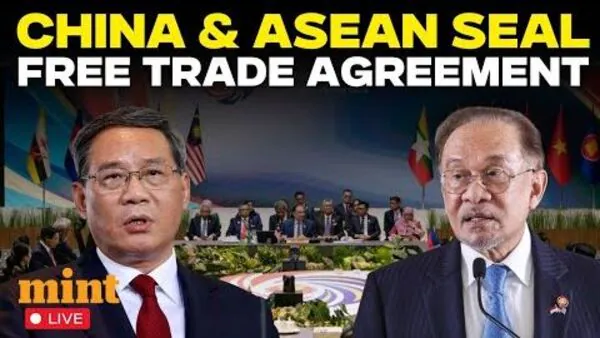
China And ASEAN Sign Upgraded Free Trade Pact To Counter Impact Of Trump Tariffs
The so-called 3.0 version of the FTA was formalised at a summit of ASEAN leaders, which was also attended by US President Donald Trump on Sunday, Reuters reported.
What does the FTA upgrade entail?The newly signed ASEAN-China FTA modernises the existing framework, which originally came into force in 2010. Negotiations for the upgrade began in November 2022 and concluded in May this year, shortly after Donald Trump imposed sweeping tariffs on major US trading partners.
Also Read | UK PM Keir Starmer thanks PM Modi for ambitious India-UK trade dealThe upgraded pact features new sections covering the digital economy, green economy and other emerging industries. China had previously indicated that the agreement would improve the market in sectors such as agriculture, the digital economy and pharmaceuticals between China and ASEAN.
Economic significance of the agreementChina views this enhanced engagement as a crucial development in response to the current global economic environment.
The 11-member bloc - ASEAN - is China's largest trading partner, with bilateral trade reaching as much as $771 billion last year, according to ASEAN statistics, quoted by Reuters.
Also Read | Brussels talks intensify as India seeks balance in EU trade dealChina is aiming to intensify its engagement with ASEAN, a region with a collective Gross Domestic Product (GDP) of $3.8 trillion, as a strategic counterbalance to hefty import tariffs imposed by the Trump administration on multiple countries around the world.
By formalising the deal, Beijing is attempting to position itself as a more open economy, despite facing intense criticism from other major powers over its own export restrictions on rare earths, as well as critical minerals, Reuters reported.
Regional trade landscapeChina and ASEAN are members of the Regional Comprehensive Economic Partnership (RCEP), currently the world's largest trading bloc. It covers nearly one-third of the global population and about 30% of global GDP.
Malaysia hosted an RCEP Summit in Kuala Lumpur on Monday, the first in five years, just before signing the new China-ASEAN deal.
Also Read | Trump Reveals Key Details On Tariffs Ahead Of Meet With Xi Jinping In SeoulSome analysts suggest that participation in blocs such as RCEP could serve as a potential buffer against US tariffs, although its provisions are considered weaker than some other regional trade deals due to competing interests among its members, reported Reuters.
Legal Disclaimer:
MENAFN provides the
information “as is” without warranty of any kind. We do not accept
any responsibility or liability for the accuracy, content, images,
videos, licenses, completeness, legality, or reliability of the information
contained in this article. If you have any complaints or copyright
issues related to this article, kindly contact the provider above.


















Comments
No comment